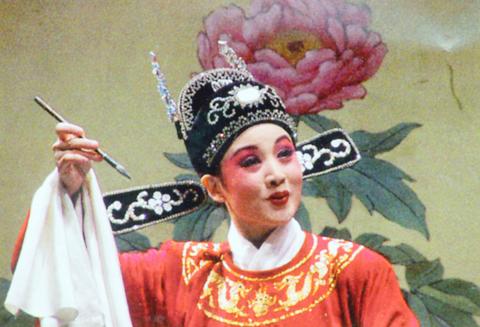Then the Anhui Huangmei Opera Troupe (
This may explain why this weekend's performances of the group's latest production, The Female Son-in-Law (
Deriving its name from a style of folk melody known as Huangmei (

PHOTO COURTESY OF ANHUI HUANGMEI
Only a couple of years after its founding, the group became one of the first opera troupes to be picked up by the then thriving Hong Kong movie industry, when its members starred in a movie adaptation of The Beauty (
The movie itself may be long forgotten, but the Huangmei folk music featured in the film went onto become the music style of choice for generations of Hong Kong chopsocky flick directors including Tsui Hark (
After its brief celluloid fame, the group returned to the stage, where, along with its numerous performances of traditional Chinese opera, it has gone on to build a reputation as one of the most contemporary of China's classical opera troupes.
Veering away from classical opera in recent years, the group has successfully brought operatic re-workings of non-operatic classics such as The Dream of the Red Chamber (
Adapted from the traditional opera penned by famed Anqing playwright Wang Zhaogan (
Having fooled almost everyone, the Emperor included, Feng encounters a lovable rogue by the name of Lee Zhaoting (
The Anhui Huangmei Opera Troupe (

“Why does Taiwan identity decline?”a group of researchers lead by University of Nevada political scientist Austin Wang (王宏恩) asked in a recent paper. After all, it is not difficult to explain the rise in Taiwanese identity after the early 1990s. But no model predicted its decline during the 2016-2018 period, they say. After testing various alternative explanations, Wang et al argue that the fall-off in Taiwanese identity during that period is related to voter hedging based on the performance of the Democratic Progressive Party (DPP). Since the DPP is perceived as the guardian of Taiwan identity, when it performs well,

The Taiwan People’s Party (TPP) on May 18 held a rally in Taichung to mark the anniversary of President William Lai’s (賴清德) inauguration on May 20. The title of the rally could be loosely translated to “May 18 recall fraudulent goods” (518退貨ㄌㄨㄚˋ!). Unlike in English, where the terms are the same, “recall” (退貨) in this context refers to product recalls due to damaged, defective or fraudulent merchandise, not the political recalls (罷免) currently dominating the headlines. I attended the rally to determine if the impression was correct that the TPP under party Chairman Huang Kuo-Chang (黃國昌) had little of a

At Computex 2025, Nvidia CEO Jensen Huang (黃仁勳) urged the government to subsidize AI. “All schools in Taiwan must integrate AI into their curricula,” he declared. A few months earlier, he said, “If I were a student today, I’d immediately start using tools like ChatGPT, Gemini Pro and Grok to learn, write and accelerate my thinking.” Huang sees the AI-bullet train leaving the station. And as one of its drivers, he’s worried about youth not getting on board — bad for their careers, and bad for his workforce. As a semiconductor supply-chain powerhouse and AI hub wannabe, Taiwan is seeing

Jade Mountain (玉山) — Taiwan’s highest peak — is the ultimate goal for those attempting a through-hike of the Mountains to Sea National Greenway (山海圳國家綠道), and that’s precisely where we’re headed in this final installment of a quartet of articles covering the Greenway. Picking up the trail at the Tsou tribal villages of Dabang and Tefuye, it’s worth stocking up on provisions before setting off, since — aside from the scant offerings available on the mountain’s Dongpu Lodge (東埔山莊) and Paiyun Lodge’s (排雲山莊) meal service — there’s nowhere to get food from here on out. TEFUYE HISTORIC TRAIL The journey recommences with